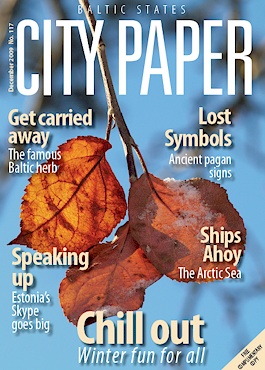History repeating: then and now
we're not sure, but here are some of the ways in which it seems we've all
been here before...
Date: 1924
Location: Estonia
Scenario: A few years after winning independence for the first time, Estonia is making impressive economic progress. Nationalist political parties are growing stronger and the influence of the Soviet Union is becoming weaker. A European stock market crash provides just the chance the Kremlin needs. With Moscow's backing, Estonian Communists attempt a coup, but the government quickly regains control without major loss of life.
Outcome: Far from breaking Estonian unity, the failed coup strengthens it,
instilling feelings of national pride and winning plaudits from abroad.
Relations with the Soviet Union become frostier than ever, but the economy
recovers and forges ahead.
Date: 2007
Location: Estonia
Scenario: A few years after winning independence for the second time, Estonia is making impressive economic progress. Nationalist political parties are growing stronger and the influence of Russia is becoming weaker. A plan to relocate a Red Army memorial provides just the chance the Kremlin needs. With Moscow's backing, Estonian Russians start to riots coup and launch ‘cyber attacks' against state institutions but the government quickly regains control without major loss of life.
Outcome: Far from shaking the Estonian economy, the riots and cyber attacks
strengthen it, instilling feelings of national pride and winning plaudits from abroad. Relations with Russia become frostier than ever, but the economy forges ahead.
Date: 1934
Location: Latvia
Scenario: After years of spectacular growth, the first problems start to emerge in the Latvian economy, partly as a result of a global economic downturn but also because a succession of weak multiparty coalition governments that seem incapable of providing effective leadership and a credible long-term policy. Latvians call for something to be done, but no-one seems quite sure what.
Outcome: Karlis Ulmanis, one of the few popular politicians left in the country and a founding father of the republic, seizes power in a bloodless coup. He becomes a ‘benevolent dictator' in a Europe increasingly dominated by dictators who are decidedly not benevolent. The economy recovers and living
standards rise rapidly.
 Date: 2007
Date: 2007
Location: Latvia
Scenario: After years of spectacular growth, the first problems start to emerge in the Latvian economy, partly as a result of a global economic downturn but also because a succession of weak multiparty coalition governments that seem incapable of providing effective leadership and a credible long-term policy. Latvians call for something to be done, but no-one seems quite sure what.
Outcome: To be decided. But someone looks likely to make play for power soon.
Vaira Vike-Freiberga is the same sort of totemic figure as Ulmanis. But has
anyone else noticed that Ainars Slesers recently adopted an Ulmanis-style
haircut and seems to fancy himself as a similar ‘strong man'?
Date: 1385
Location: Lithuania / Poland
Scenario: The Polish nobility becomes wary of the growing threat of Muscovy to the east and the Teutonic Knights to the west. Lithuania has similar concerns. Realising this, envoys draw up a set of ‘promises' around the marriage of Grand Duke Jogaila of Lithuania and Queen Jadwiga of Poland that turn the wedding into a diplomatic treaty as much as a pre-nuptial agreement. These promises include conversion to Catholicism and a hefty compensation payment to William of Austria, to whom Jadwiga had previously contracted herself. In fact only Jogaila actually signs on the dotted line, with Jadwiga playing hard to get before finally climbing into bed.
Outcome: The promises become known as the Union of Krewo, the first in a series of treaties and agreements that turns Poland-Lithuania into one of Europe's superpowers, culminating in the Union of Lublin (1569), which officially unites the two countries.
Date: 2007
Location: Lithuania / Poland
Scenario: The Polish parliament becomes wary of the growing energy power of
Russia to the east and its plans to build a gas pipeline to Germany in the
west, bypassing Poland. Lithuania has similar concerns. Realizing this,
politicians draw up proposals to construct a new Baltic nuclear power plant at Ignalina. These proposals include granting Lithuania a larger share of the
project than the other members of the project. The Polish government plays hard to get, first seeming enthusiastic and then seeming reluctant to sign on the dotted line before finally committing itself to the project.
Outcome: To be decided. Poland and Lithuania are certainly developing a close
relationship, particularly on energy, and both are keen to place Eastern Europe higher on the EU's agenda.




